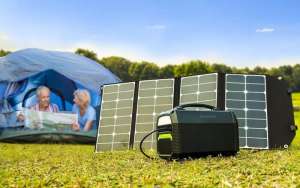A battery generator is a useful device for powering up your electronic devices while camping without any access to an electrical grid. It will provide you with the convenience of powering up your fridge or freezer, radios, coffee maker, television, and more, making your camping trip an enjoyable one.
Battery generators are a convenient and reliable source of power for charging your devices or running appliances. You can charge the generators by plugging them into your car or use the eco-friendly option to power them with solar panels.
This guide will help you select the best battery generator for your camping trips.
1. Assess your Power Needs
This is an important factor when selecting a top battery generator for your camping trips. Determine the amount of power required to run the devices you wish to use and the starting output requirement.
The starting power output for many appliances is typically three or four times higher than the running power. You need to work out how many appliances you will be running simultaneously and add the wattage for each device to know your power needs.
2. Weight
When selecting a battery generator for camping, the weight of the generator will also influence your decision. Most generators are bulky and can be challenging to carry around from one place to another. A high wattage generator will be heavy and will need an extra pair of hands to lift.
Some of the models may come with wheels for effortless mobility. However, you need to check the size of wheels whether they can easily roll on grass. Usually, a lightweight, compact generator is a convenient option for camping trips.
3. Noise Level
The noise level of generators varies a lot between different brands and models. Usually, cheaper generators tend to be louder. A noisy generator can hamper a peaceful environment defeating the very purpose of camping. So, make sure you select a generator that offers a quiet and vibration-free operation. A generator with a low decibel output will be an ideal choice for camping trips. With no noise, you will forget that you are using a generator.
4. Run Time
The run time is the maximum time a battery generator can run on a single charge. It depends on your personal preference and the number of devices you will use while camping. Battery-powered generators can usually sustain for 5 to 12 hours on a single charge. For long-term use, the generator you choose should have an extended run time.
5. Safety Features
The top battery generators come equipped with safety features. Short circuit protection, voltage stabilization, and temperature control will keep your sensitive appliances safe. Some models use pure sine wave technology to give cleaner energy to your appliances.
6. Recharge Time
Battery generators need to be recharged after they run out of power. The amount of time it will take to charge will depend on the battery capacity. If the battery is recharged using solar panels, it can take longer than recharging via an AC power source.
7. Number of Outlets
While camping, you might need to use different appliances at a time. Check the number of outlets in a generator is essential to determine its usability. Four or more outlets will provide you with the convenience of charging different appliances simultaneously while using the maximum wattage.
Also, pay attention to the type of outlet you need for your devices to plug into. A generator with a USB outlet can be quite useful if you need to charge your phone or camera.
Battery generators make for a great outdoor companion. Ultimately, the right selection will depend on the amount you are willing to spend on buying a top-quality battery generator.











